The social climate of social networking sites
Fully 85% of adult SNS users say that in their experience people are mostly kind in social networking spaces. An additional 5% say their experience is that people are mostly unkind and 5% say their answer depends on the situation. The remainder of SNS users said they didn’t know how to answer the question or refused to answer it.
These answers paint an even more positive portrait of the emotional and social climate of social networking sites than the generally positive assessment offered by teens.
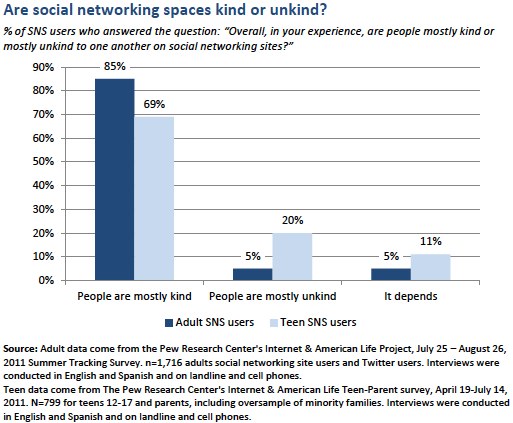
White adult SNS users were more likely than blacks to report their overall experience was one of kindness in social networking spaces (88% vs. 77%), and black SNS users were more likely than whites to report that unkindness was the prevalent tone (12% vs. 3%). In addition, suburban SNS users (87%) were somewhat more likely than urban residents (80%) to say that the overall tone of social networking spaces was that people were kind. And people who use SNS only sparingly are somewhat less likely than others to report that kindness prevails and more likely to say they don’t know which trait is most in evidence.
Altruism vs. nastiness
Adult SNS users were asked a question that did not appear in the teen survey: “When you’re on a social networking site, how often do you see people being generous or helpful?” Some 39% of adult SNS users said they frequently saw acts of generosity, 36% said they sometimes saw it, 18% said they saw it “only once in a while” and 5% said they never saw it. The SNS users who were most likely to say they frequently saw people being generous or helpful included whites (41%), college graduates (45%), and those living in households earning $75,000 and above (46%).
When it came to unpleasant behavior on SNS, adults have seen their share, but it tends to be evident to them far less frequently than it is to teen SNS users. Both groups were asked the same question: “When you’re on a social networking site, how often do you see people being mean or cruel?” Some 49% of SNS-using adults said they saw mean or cruel behavior displayed by others at least occasionally, far lower than the 88% of SNS-using teens who said they had seen mean or cruel behavior at some point. Moreover, 29% of SNS-using adults said they had never seen mean or cruel behavior on the sites, compared with 11% of teens who said they had never seen it.
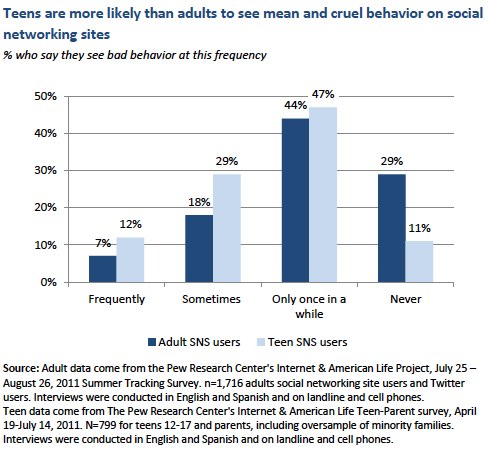
Social network site users in the Millennial generation reported quite similar rates of witnessing mean and cruel behavior as their younger peers in the teen cohort: 9% of SNS-using Millennials said they frequently saw mean and cruel behavior; 25% of them see it sometimes; 48% see it “only once in a while”; and 16% said they never see it. Frequent users – those who use SNS at least once a day – are also more likely to see mean or cruel behavior more often.
Offensive language and images
We wanted to get an extra reading about the tone of content and conversation on SNS in addition to getting more specific readings on mean and cruel behavior. So, one of the questions we asked adult SNS users that was not asked of teens was: “How often do you see people using language, images or humor on social networking sites that you find offensive?”
Nearly three-quarters (73%) said they encountered such offensive content or language only once in a while or never. Specifically, the responses were:
- 11% of adult SNS users said they saw people using such language and images frequently
- 15% said they saw others using such language and images sometimes
- 38% said they saw others using such language and images only once in a while
- 35% said they never saw others using such language and images
Minorities, women, parents of minor children, and Millennials were the most likely to encounter offensive language, images, or humor.
- 42% of black SNS users said they frequently or sometimes saw language, images or humor on SNS that they found offensive, compared with 22% of white SNS users. In addition, 33% of Hispanic SNS users said they encountered such material with that level of frequency, which is notably higher than whites.
- 34% of Millennial generation SNS users – those ages 18-34 – said they frequently or sometimes saw language, images or humor on SNS that they found offensive, compared with 17% of SNS users in GenX (those ages 35-46). Even smaller percentages of SNS-using Baby Boomers and retirees said they had encountered such material.
- 29% of women SNS users said they frequently or sometimes saw language, images or humor on SNS that they found offensive, compared with 22% of men.
- 29% of SNS users who are parents with minor children said they frequently or sometimes saw language, images or humor on SNS that they found offensive, compared with 24% of nonparents.
Positive and negative personal outcomes
Social networking site users were asked several questions about the personal experiences they have had on the sites and they overwhelmingly reported that good outcomes had outnumbered bad outcomes. In broad terms, adult users of SNS were just as likely as teen users to have good things happen to them and less likely to have unpleasant things happen to them. Some 76% of the SNS users said they had at least one of the positive outcomes we queried. Specifically:
- 68% of adult SNS users said they had an experience on the site that made them feel good about themselves
- 61% of adult SNS users said they had an experience that made them feel closer to another person
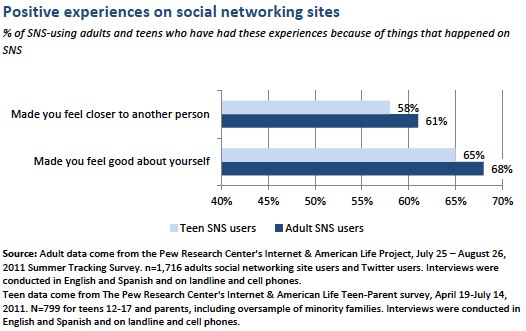
Interestingly enough, there were no notable demographic differences related to these positive outcomes. Among SNS users, women and men, blacks and whites and Hispanics, young and old, relatively well-off and relatively poor, highly educated and those with high school diplomas, rural and urban and suburban all reported similar levels of pro-social experiences.
On the negative side, 26% said they had experienced at least one of the bad outcomes that were queried in the survey. Again, adult experiences on SNS are less likely to be harmful than the teen experience: 41% of SNS-using teens reported they had at least one negative outcome. Specifically:
- 15% of adult SNS users said they had an experience on the site that ended their friendship with someone. That is somewhat less than the 22% of SNS-using teens who reported having this problem.
- 12% of adult SNS users had an experience that resulted in a face-to-face argument or confrontation with someone. Fully 25% of SNS-using teens said this had happened to them as a result of their using the site.
- 11% of adult SNS users had an experience that caused a problem with their family. Some 13% of SNS-using teens said their use of the sites had caused a problem with their parents.
- 3% of SNS-using adults said they had gotten into a physical fight with someone based on an experience they had on the site. Some 8% of SNS-using teens said they had gotten into a fight because of what happened on the site.
- 3% of adult SNS users said their use of the site had gotten them in trouble at work. Some 6% of SNS-using teens said they had gotten into trouble at school because of things that had happened on the site.
Among adults, some of these anti-social experiences are most prevalent among SNS users in the Millennials generation. This cohort of those between the ages of 18 and 34 was twice as likely as its elders to report that a friendship had ended because of an SNS experience – 21% of SNS-using Millennials said that had happened to them, compared with 11% of all other SNS users. In addition, 19% of SNS-using Millennials said an experience on the site had resulted in a face-to-face argument or confrontation, compared with 6% of other SNS users. Some 17% of Millennials said that they have had someone act in a mean or cruel way towards them personally on a social networking site in the previous 12 months, compared with 7% of other SNS users. And 6% of SNS-using Millennials said they had gotten into a physical fight because of an experience on the site, compared with 1% of other SNS users.
The same pattern holds for the most frequent users of social networking sites, who also happen to be relatively young. Those who use the sites multiple times a day are significantly more likely than less-frequent users to have had these negative experiences tied to their use of SNS: face-to-face confrontations, broken friendships, a problem in the family, gotten into trouble at work.
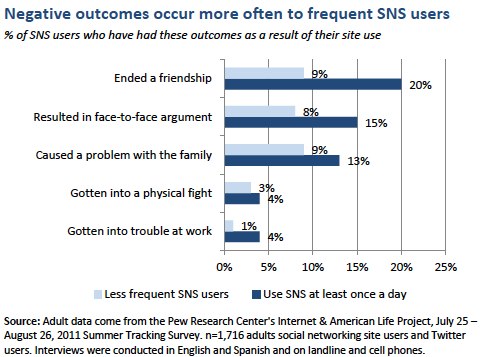
Just as we found among teens, SNS-using adults from lower-income households were more likely than better-off users to have had bad outcomes. For instance:
- 23% of SNS users living in households earning less than $30,000 had ended a friendship over something they experienced on a social networking site, compared with 12% of SNS users living in higher income households.
- 17% of SNS users living in households earning less than $30,000 had a face to face argument over something they experienced on a social networking site, compared with 9% of SNS users living in higher income households.
- 6% of SNS users living in households earning less than $30,000 had gotten into a physical fight over something they experienced on a social networking site, compared with 2% of SNS users living in higher income households.
Finally on the subject of negative experiences on social networking sites, 13% of adult SNS users said that someone had acted in a mean or cruel way towards them on the site in the past 12 months. This was the only question about a negative outcome where we included a timeframe in our question. Some 15% of SNS-using teens reported this problem.
What adults do when they see problems on social networking sites
As we noted above, 49% of adult SNS users at least occasionally see others being mean or offensive on the sites, a substantially smaller proportion than the 88% of teenage SNS-users who report they see such behavior at least occasionally. We asked the adults who had seen mean or offensive behavior on SNS what they do themselves in response. It turns out that compared to teen SNS users, adults are somewhat more likely to stand back, not get involved, and ignore the offensive behavior.
For instance, 45% of adult SNS users who have witnessed problems say they frequently ignore offensive behavior on social network sites, compared with 35% of SNS-using teens who say they frequently ignore offensive behavior. Some 34% of adult SNS users say they never confront the person being offensive, compared with 21% of SNS-using teens who never take that step. Some 29% of adults who have witnessed problems never defend the person or group being attacked, compared with 19% of teens who never take that action.
At the same time, adults who have seen harassment on SNS are a bit less likely than teens to say they join in the harassment that they see occurring on social networking sites.
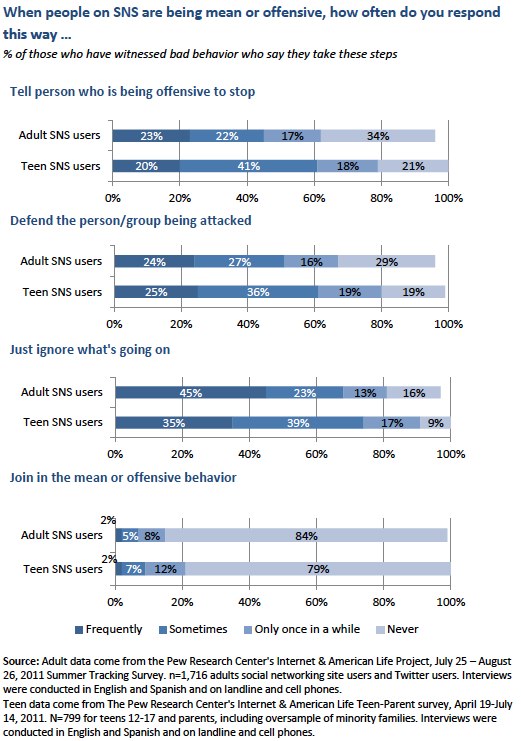
Unlike many other aspects of social networking site use, age does not matter when it comes to people’s personal responses when they witness mean or offensive behavior. Young and old have similar patterns of response. However, there is a split when it comes to the behavior of men and women. Men are more likely to ignore a problem they see on a social networking site and women are more likely to respond. For instance:
- 26% of SNS-using women will frequently tell a person to stop attacking someone on a social networking site, but only 19% of SNS-using men will do that frequently. At the same time, 41% of men say they never tell someone to stop harassing another on a social networking site, while only 29% of women say they never take action when they see a problem unfolding.
- Similarly, 28% of SNS-using women say they frequently defend a person or group that is being harassed or insulted, while only 19% of men say they will frequently do so. At the same time, 33% of SNS-using men say they never defend a person or group that is under attack on a social networking site, compared with 25% of women who say they never defend someone under attack.
- Women who use SNS (87%) are also somewhat more likely than SNS-using men (81%) to say they never harass someone who is being harassed on a social networking site.
What SNS users see others doing when someone comes under attack on a social networking site
When it comes to the general tone of conversation and interactions on social networking sites, adults often see others ignoring the problems: 45% of SNS-using adults who have witnessed mean or offensive behavior say it is frequently their observation that others just ignore the offensive behavior and another 28% say that others sometimes ignore the offensive behavior. Teen SNS users were even more likely than that to say they observed that others ignored the harassment: 55% of the teens who had seen mean behavior on SNS said that was frequently the response they witnessed.
Some 36% of SNS-using adults who have seen social problems on the site say they see others at least sometimes join in the harassing behavior; while 54% at least sometimes see others defend the person under attack and 48% at least sometimes see others tell the harasser to stop.
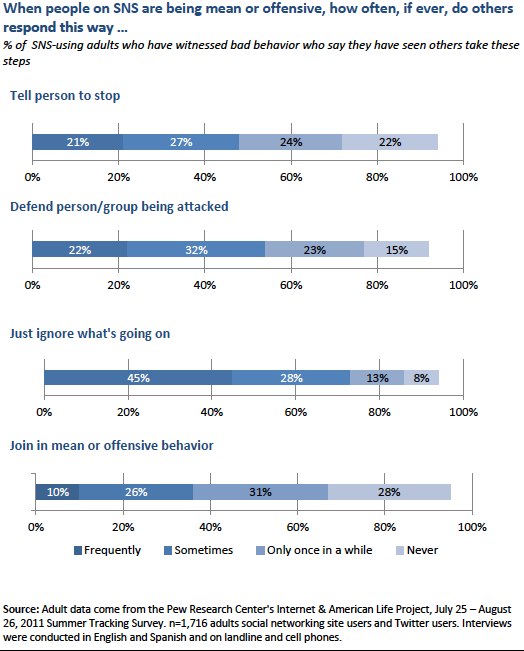
The one noteworthy demographic factor here is that younger SNS users who had witnessed anti-social behavior on the sites are much more likely to see others join in harassment of someone on SNS than older site users.
Second thoughts about posting on social networking sites
We asked all the online adults in our sample if they had ever decided not to post something online because they were concerned that it might reflect badly on them and 45% reported they had made that kind of decision. Interestingly enough, a greater share of online teens – 55% – had made a similar decision.
Among the online adults who were most likely to decide not to post something because of its impact on their reputation: Millennials (59%), those who live in households earning $75,000 or more (54%), and those with college degrees (51%).


